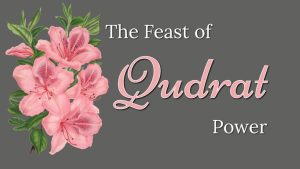
On Jalál, 1 Quadrat (4 November), Bahá’is observe the Nineteen Day Feast celebration of Qudrat which is translated as Power.
Nineteen Day Feasts are regular community gatherings, occurring on the first day of each month of the Baháʼí calendar (and are often nineteen days apart from each other). Each gathering consists of a Devotional, Administrative, and Social part.
Click link for a sample devotional programme.
Glorified art Thou, O Lord my God! Every man of insight confesseth Thy sovereignty and Thy dominion, and every discerning eye perceiveth the greatness of Thy majesty and the compelling power of Thy might. The winds of tests are powerless to hold back them that enjoy near access to Thee from setting their faces towards the horizon of Thy glory, and the tempests of trials must fail to draw away and hinder such as are wholly devoted to Thy will from approaching Thy court. Methinks, the lamp of Thy love is burning in their hearts, and the light of Thy tenderness is lit within their breasts. Adversities are incapable of estranging them from Thy Cause, and the vicissitudes of fortune can never cause them to stray from Thy pleasure. I beseech Thee, O my God, by them and by the sighs which their hearts utter in their separation from Thee, to keep them safe from the mischief of Thine adversaries, and to nourish their souls with what Thou hast ordained for Thy loved ones on whom shall come no fear and who shall not be put to grief.
Bahá’u’lláh, Prayers and Meditations, I, p. 3
Consider the rational faculty with which God hath endowed the essence of man. Examine
thine own self, and behold how thy motion and stillness, thy will and purpose, thy sight and
hearing, thy sense of smell and power of speech, and whatever else is related to, or
transcendeth, thy physical senses or spiritual perceptions, all proceed from, and owe their
existence to, this same faculty. So closely are they related unto it, that if in less than the
twinkling of an eye its relationship to the human body be severed, each and every one of these
senses will cease immediately to exercise its function, and will be deprived of the power to
manifest the evidences of its activity. It is indubitably clear and evident that each of these
afore-mentioned instruments has depended, and will ever continue to depend, for its proper
functioning on this rational faculty, which should be regarded as a sign of the revelation of
Him Who is the sovereign Lord of all. Through its manifestation all these names and attributes
have been revealed, and by the suspension of its action they are all destroyed and perish. It
would be wholly untrue to maintain that this faculty is the same as the power of vision,
inasmuch as the power of vision is derived from it and acteth in dependence upon it.
(Bahá’u’lláh: Gleanings, Page: 164)
Now is the moment in which to cleanse thyself with the waters of detachment that have flowed
out from the Supreme Pen, and to ponder, wholly for the sake of God, those things which,
time and again, have been sent down or manifested, and then to strive, as much as lieth in thee,
to quench, through the power of wisdom and the force of thy utterance, the fire of enmity and
hatred which smouldereth in the hearts of the peoples of the world.
(Bahá’u’lláh: Epistle to the Son of the Wolf, Page: 12)
Ascension of ‘Abdu’l-Bahá is a day commemorating the death of ‘Abdu’l-Bahá, the eldest son and successor of Bahá’u’lláh, founder of the Baha’i faith.
The typical observance consists of devotional readings and is held at 1:00 AM, as ‘Abdu’l-Bahá passed away about 1:00 AM on 28 November, 1921.
‘Abdu’l-Bahá was the eldest son of Bahá’u’lláh who referred to Him as “the Mystery of God” and “a shelter for all mankind”, however ‘Abdu’l-Bahá preferred to be called “Abdu’l-Baha” which means “the Servant of Bahá” about His servitude to Bahá’u’lláh. When ‘Abdu’l-Bahá passed away on 28 November 1921, He was eulogized as One who led humanity to the “Way of Truth,” as a “pillar of peace” and the embodiment of “glory and greatness.”
Bahá’u’lláh, in a prayer revealed in ‘Abdu’l‑Bahá’s honour, supplicates:
“Thou knowest, O my God, that I desire for Him naught except that which Thou didst desire, and have chosen Him for no purpose save that which Thou hadst intended for Him. Render Him victorious, therefore, through Thy hosts of earth and heaven…”